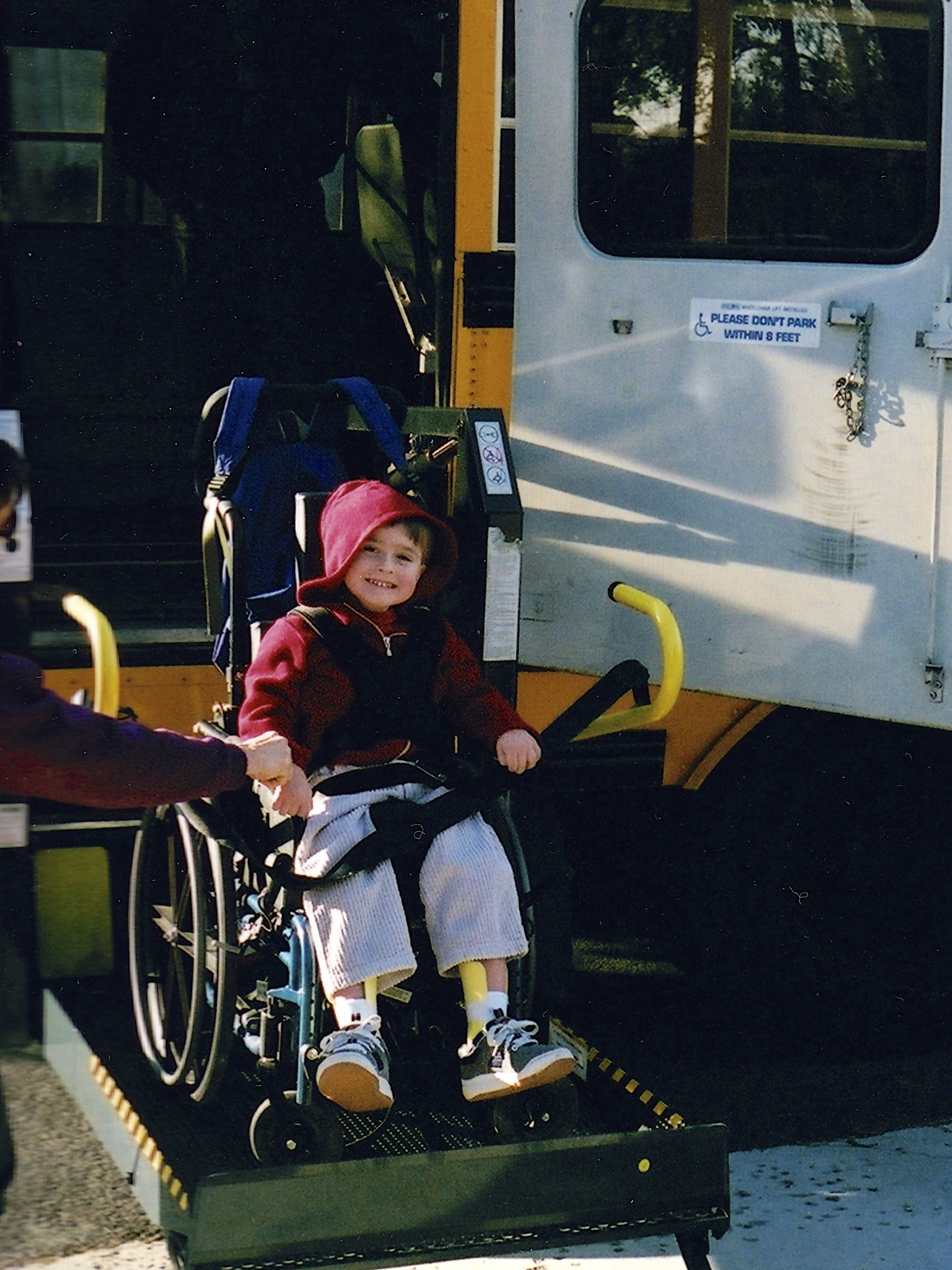How Do You Stay Prepared? Let’s Talk (by Jeneva Stone)
Rob Stone getting on the school bus in the early 2000s [image description: a very young boy is seated in his wheelchair being lifted into the back of his school bus on a mechanical lift. He wears a hooded jacket and is smiling.]
I can still remember our family’s first encounter with disaster preparedness–or lack thereof–it was the day of 9/11, 2001, and my son Rob was four years old. My husband and I had waved him off to preschool on that beautiful, bright blue morning at our home in the Washington, DC suburbs. An hour later, disaster struck. My medically complex and disabled child was miles away and I didn’t know what to do.
Phone lines were jammed; all the main routes in the DC area were clogged with traffic. I was frantic–unable to figure out whether Rob was safe, or when he might come home, or how I could even get to him. I was also waiting on a plane that would deliver a medication solvent Rob needed–I didn’t know if it had been diverted. Without that solvent, his acid reflux would spiral out of control. While the 9/11 attacks, in the end, were limited to some very specific targets, at the time, no one in the DC metro area knew whether this would be a continuous and sustained assault–communications, the power grid, access to pharmacies and hospitals were all a big question mark.
Two decades later, we’re all inhabiting a world that’s vulnerable to the effects of climate change, and our power grids are increasingly subject to failure. In recent years, social and political tensions in the U.S. have led to violence and unrest in our communities, including attacks on the power grid, and attacks–real or threatened–on state houses and the U.S. Capitol.
While our families are accustomed to contingency planning on an everyday basis, who will look out for us when something major strikes? The scary truth is, no one looks out for disabled people when disasters like 9/11, natural or man-made, strike.
In recent months, California, New York, and North Carolina have all been affected by storms and prolonged power outages. As Alice Wong says:
“Whether they are caused by wildfires, earthquakes, hurricanes, flooding or storms, power outages are a life-and-death issue for many of us. Time and time again, disabled and older people are left behind or not prioritized in emergency planning.”
The Partnership for Inclusive Disaster Strategies is trying to ensure that governments have disaster planning in place for people with disabilities: “[We are] the only U.S. disability-led organization with a focused mission of equity for people with disabilities and people with access and functional needs throughout all planning, programs, services and procedures before, during and after disasters and emergencies.” Tip: Bookmark their website on your phone–there are great resources.
Currently, Medicaid rules in most states cut us off from two of the lifelines we need to survive under emergency circumstances: Access to home generators and backup supplies of medication.
In 2001, it was easier to “get ahead” on medications, and I was able to squirrel away at least a week’s worth to put in Rob’s go bag. However, insurers have been tightening up on prescriptions, and now we can only stay a few days ahead. A California family experienced this horrible situation during recent flooding. Federal and state Medicaid rules need to be changed to provide a modicum of support for disabled persons during these increasingly common disasters.
I’ve learned to be as prepared as I can, although I worry it isn’t enough. In addition to go-bags, while planning for a summer vacation, I found that I could buy back-of-seat storage units for our van, which can hold essential supplies at the ready on a regular basis. I also keep the car chargers for Rob’s equipment in the glove compartment at all times. We have day and night medication and treatment schedules on paper and on our phones.
You all know the drill. So let’s talk tips and tricks: How do you stay prepared? What’s your advice?
Jeneva Stone is the Little Lobbyists blog manager.

